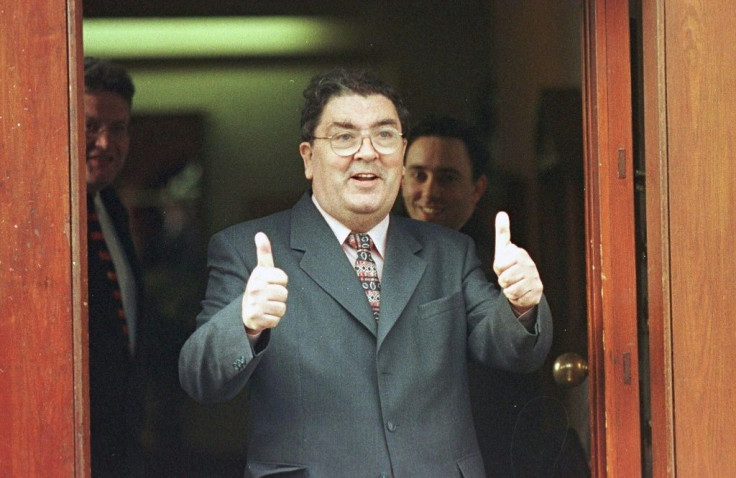John Hume, Northern Ireland Political Icon, Nobel Peace Prize Recipient, Dies At 83

KEY POINTS
- Hume took great risks in the late 1980s when he opened talks with Gerry Adams of Sinn Fein
- Hume shared the Nobel Peace Prize with David Trimble
- Major politicians, including Tony Blair, Bill Clinton and Boris Johnson, mourned Hume's passing
John Hume, a prominent Northern Ireland politician who played a key role in securing a 1994 cease-fire by the Irish Republican Army, has died in Londonderry at the age of 83 following a long illness.
A founding member of the Social Democratic and Labour Party, or SDLP, Hume received a Nobel Peace Prize for his efforts to help bring an end to the ‘Troubles’ in Northern Ireland. Hume led the party from 1979 until November 2001.
Hume took great risks in the late 1980s when he opened talks with Gerry Adams, then the leader of Sinn Féin, which was affiliated with the Irish Republican Army. These talks led to the 1994 IRA cease-fire and the Good Friday Agreement four years later. That historic agreement essentially ended the political violence that had scarred Northern Ireland for decades.
Adams said on Monday that Hume was "a political leader genuinely prepared to look at the bigger picture and to put the wider interests of society above narrow party politics.”
Adams said meeting with Hume represented a "breakthrough moment in Irish politics.”
"When others were stuck in the ritual politics of condemnation, John Hume had the courage to take real risks for peace," Adams added.
As a result of the 1998 peace deal, Hume shared the Nobel Peace Prize with David Trimble, then the leader of the Ulster Unionist Party.
Trimble said Hume was a “major contributor to politics in Northern Ireland, particularly to the process that gave us an agreement that we are still working our way through.”
"He will be remembered for that contribution for years to come," Trimble added.
The BBC reported Hume was “widely admired for his steadfast commitment to peaceful, democratic politics during three decades of violence in Northern Ireland.”
Former British Prime Minister Tony Blair -- who was in office when the Irish peace deal was signed -- praised Hume as "a visionary who refused to believe the future had to be the same as the past.”
"His contribution to peace in Northern Ireland was epic and he will rightly be remembered for it," Blair said. "He was insistent it was possible, tireless in pursuit of it and endlessly creative in seeking ways of making it happen."
Former Irish Prime Minister Bertie Ahern, who co-signed the 1998 peace deal with Blair, said Hume "saw the bigger picture" in Irish politics.
"When the Good Friday Agreement was signed by Tony and I, he [Hume] said: 'You put this to the people north and south and it will get the legitimacy of the people. That was singularly his idea and it really was a bright idea.”
Current British Prime Minister Boris Johnson said Northern Ireland "lost a great man who did so much to help bring an end to the Troubles and build a better future for all.”
Johnson added that Hume's vision "paved the way for the stability, positivity and dynamism of the Northern Ireland of today.”
Former U.S. President Bill Clinton said Hume "fought his long war for peace in Northern Ireland.
"His chosen weapons: an unshakeable commitment to nonviolence, persistence, kindness and love," Clinton said. "With his enduring sense of honor, he kept marching on against all odds towards a brighter future for all the children of Northern Ireland."
SDLP co-founder Austin Currie called Hume “the greatest Irishman” since Charles Stewart Parnell, the 19th century Irish nationalist leader.
"His place in Irish history is richly deserved. Hume's consistency provided a compass through some terrible times," Currie said.
Current SDLP leader Colum Eastwood said Hume “ended 800 years of conflict between Britain and Ireland.” His death, Eastwood noted, “represents the loss of 20th-century Ireland’s most significant and consequential political figure.”
The current Irish Prime Minister Micheal Martin celebrated Hume as "a true peacemaker.”
"During the darkest days of paramilitary terrorism and sectarian strife, he kept hope alive. And with patience, resilience and unswerving commitment, he triumphed and delivered a victory for peace," he said.
Northern Ireland's First Minister Arlene Foster hailed Hume as a "giant in Irish nationalism.”
"In our darkest days he recognized that violence was the wrong path and worked steadfastly to promote democratic politics," Foster added.
Hume also served as member of the European Parliament for more than 25 years, and held a seat in the British parliament as MP for Foyle, Northern Ireland for nearly 22 years.
Current Sinn Féin leader Mary Lou McDonald described Hume as "a national icon.”
Archbishop Eamon Martin, the head of the Catholic Church in Ireland, described Hume as "a paragon of peace, a giant of a statesman whose legacy of unstinting service to the common good is internationally acclaimed.”
© Copyright IBTimes 2025. All rights reserved.





















